Summary of Book 1 and Discussion Highlights
For those who want to remember what was in the first book of the Brothers Karamazov chapter by chapter, what we discussed before reading the second book.
Greetings to all Dostoevsky enthusiasts!
Useful materials.
Introductory article for the Book 1
Concluding article for the Book 1
In February, we will begin reading the second book of The Brothers Karamazov — An Unseemly Encounter. To prepare, I have provided a chapter-by-chapter review of the first book. I have distilled the highlights from our five discussions into a concise digest. Each chapter section includes a synopsis, key discussion points, and some comments from fellow book club members.
Chapter 1.1 Fyodor Pavlovich Karamazov
The chapter is named after the family patriarch. We know nothing about Fyodor Pavlovich's own parents, except that he came from poor landowners. At age 27-28, he marries for the first time—to a young and wealthy landowner, Adelaida Ivanovna Miusova. From this union comes the first Karamazov son, Dmitry.
When Dmitry was 3 years old, Adelaida flees from her husband and son to Petersburg. There she meets a tragic end, succumbing either to the city's harsh conditions or to typhus.
Some points that we discussed:
The chapter opens with Alexei, the youngest son, whom the narrator identifies as the novel's main character, despite this being chronologically out of sequence. The narrator deliberately draws our attention to him.
From the start, we learn of Fyodor Pavlovich's tragic fate, though the details remain mysterious. The narrator, writing in 1879, tells of events that will unfold in 1866.
How do we reconcile Fyodor Pavlovich's character with his financial success? Though portrayed as a drunken pauper and malicious buffoon, he accumulates 100,000 rubles by his death (equivalent to about one and a half million US dollars today). Is this truly a contradiction?
What should we make of Fyodor Pavlovich's reaction to Adelaida's death?
Link to our discussion of this chapter.
Some interesting comments of
and about Adelaida's decision to run away.Chapter 1.2 — The eldest son is packed off
The narrator continues the story of the Karamazov family. As he himself says, he needs this introduction before moving on to the novel proper. We learn about Dmitry's upbringing, who he lived with and how, and more details about the inheritance problem — this conflict serves as the starting point for the novel.
After Adelaida's death, Fyodor Pavlovich, the father, completely forgets about his son. For a year, he is raised by the servant Grigory. After that, he is taken in by Adelaida's cousin and Dmitry's uncle - Pyotr Alexandrovich Miusov.
Some points that we discussed:
What are your thoughts on the narrator's approach? Though we know nothing about this third-party storyteller, their voice shapes our entire understanding of events.
Consider Fyodor Pavlovich's actions—could he truly have forgotten his son's existence, or was his neglect deliberate?
How did Dmitry's unstable upbringing—being passed between families "like an object"—shape the person he became?
Is Dmitry's preoccupation with his inheritance a reflection of his father's money obsession, or is it a justified concern given his father's character?
The narrative presents Pyotr Alexandrovich, Mitya's maternal cousin, as an enlightened European. Given his significant role in the upcoming story, what's your impression of his supposed enlightenment and intelligence? (Dostoevsky's choice of the name Pyotr is significant—it alludes to Peter the Great, the founder of St. Petersburg, whose reforms Dostoevsky believed had stripped Russia of its cultural identity).
Link to our discussion of this chapter.
Some interesting comments of
and about Dmitry's upbringing and the beginning of this inheritance conflict.Chapter 1.3 Second Marriage, Second Brood
In this chapter, we learn about the mother of the other two brothers — Sofya Ivanovna and her fate, which was in many ways similar to that of the first wife Adelaide. After Sofya's death, the two boys Ivan and Alexei were also initially raised by the servant Grigory, then taken in by a "distant" relative, and later by Efim Petrovich Polenov. This chapter focuses more on Ivan's coming of age, how he was intelligent, studied at university, and earned his living through journalism.
Some points that we discussed:
Consider the striking parallels between Fyodor Pavlovich's two wives. Despite their opposite natures—Adelaida being wealthy, strong-willed, and defiant enough to beat her husband and leave him, while Sofya was a modest, timid orphan (hence her missing maiden name)—their fates converged tragically. Karamazov destroyed them both. What aspects of their parallel destinies do you find most compelling?
The narrator notes that Sofya Ivanovna became a "klikusha"—a term rooted in the Russian words for screaming and calling. This condition went beyond mere hysteria; those afflicted would fall into fits, screaming and speaking in different voices. In Western terms, it resembled demonic possession, often warranting exorcism. It's telling that this "possession" manifested after she took the Karamazov name through marriage.
The narrator leaves ambiguous whether Fyodor forgot these sons as he did Dmitri—though evidence suggests he did. What do you make of the scene with General Vorokhov's widow?
What are your thoughts on Ivan? While Dmitri, the firstborn, grew up isolated, Ivan stepped into the role of eldest brother by caring for Alyosha. His approach to money and responsibility presents a stark contrast to his father's character.
The narrator's reference to "our monastery" raises intriguing questions: Does this "our" simply indicate his residence in the town, or suggest his connection to the monastery itself? This detail also prompts us to question how he gained such intimate knowledge of the town's secrets.
Link to our discussion of this chapter.
Some interesting comments of
about interesting details in the description of the wives, especially Sophia. And 's comment about who our narrator really is.Chapter 1.4 — The third son is Alyosha
This chapter introduces us to the youngest brother, Alyosha, who arrives in his father's town with uncertain motives regarding his mother's grave. We learn how Fyodor Pavlovich accumulated his wealth after abandoning his sons—by establishing a network of taverns and becoming a moneylender. This business venture perfectly aligned with his two consuming interests: alcohol and money. The chapter concludes with Alyosha's decision to pursue monastic life.
Some points that we discussed:
Now that we've met the three sons (in broad strokes), which one resonates with you most? Their comparison is fascinating, as each represents a distinct domain—spirit (Alyosha), mind (Ivan), and body/heart (Mitya). We'll explore these contrasts and their allegorical meanings throughout the novel.
Our narrator reveals intriguing details: He knows Alexei's innermost thoughts about his mother and his single memory of her. Some suggest the narrator might live in the monastery or could even be Ivan himself. Following how our perception of the narrator evolves throughout the story proves fascinating.
It's telling that Pyotr Miusov comments on how both Alyosha and Ivan (in Chapter 1.3) handle money, yet offers no such insight about Dmitri—despite being his guardian.
Consider Fyodor Pavlovich's impulsive gesture of giving a thousand rubles for Adelaida's memorial service, prompted by Alyosha—a son from his second marriage.
We discover that Fyodor isn't completely detached from religion—he seeks prayers on his behalf and shows curiosity about the afterlife. He seems aware that his lifestyle leads to one destination: hell, which intrigues him. His understanding of hell comes from literature, and we learn he's well-read enough to know French, quoting from Charles Perrault's l'Eneide. This work presents hell where everything—from coachman to carriage—exists only as shadows.
Link to our discussion of this chapter.
Some interesting comments of
about Alyosha's memories of his mother, which were reminiscent of a scene from David Lynch's film "The Elephant Man". You can watch it here.And an interesting comparison from
about the perception of hell with shadows.Chapter 1.5. — Startsy or Elders
This chapter introduces Elder (Starets) Zosima and explains the role of elders in the monastery. An elder serves as a spiritual guide, standing above other monks due to their exceptional righteousness and wisdom—a position they hold not only over lay worshippers but all monastics. Eldership combines Orthodox Christian teachings with rigorous ascetic practices, allowing these spiritual leaders to pursue divine knowledge through love. These elders often reached remarkable heights of ascetic devotion and self-denial.
We will explore Elder Zosima's character and the monastery's significance in greater detail during the second book, which takes place in this setting.
Some points that we discussed:
In this "family chronicle," a separate chapter is dedicated to Zosima, who becomes Alyosha's spiritual father and, arguably, part of the family itself. Should we consider Elder Zosima a true member of this family?
We discover Alyosha's essence—stubborn and uncompromising in his pursuit of perfection. This drives him to the Kozelsk Optina Monastery, where he believes in total dedication to service. Following his mentor Elder Zosima's path of complete religious devotion, Alyosha may aspire to reach similar spiritual heights. How does he reconcile his innate kindness with such unwavering stubbornness? One might expect him to grow cynical toward an imperfect world and its people.
What impression does Zosima make on you? While Alyosha maintains absolute faith in his miraculous powers, the narrator describes the alleged healings with notable skepticism.
The brothers exhibit markedly different personalities. Having been raised separately since childhood, Alyosha and Ivan barely know each other as adults. Yet surprisingly, Alyosha has formed a stronger connection with Dmitri. Could their different educational backgrounds explain this unexpected bond, as the narrator suggests?
The narrator prepares us for the main story—beginning with the family gathering at Zosima's hermitage. With Miusov's attendance as well, what do you anticipate: a peaceful meeting or an inevitable disaster?
Link to our discussion of this chapter.
Some interesting comments of
about the Tower of Babel and why its mention is important.And a comment of
about why Alyosha admires Elder Zosima.There were many more interesting comments and reflections - I encourage you to read the chats and participate in the discussions if you're interested.
And we begin the second book. Soon (Feb 1-2) there will be a preliminary article about it with a new bookmark and several points to dive into.




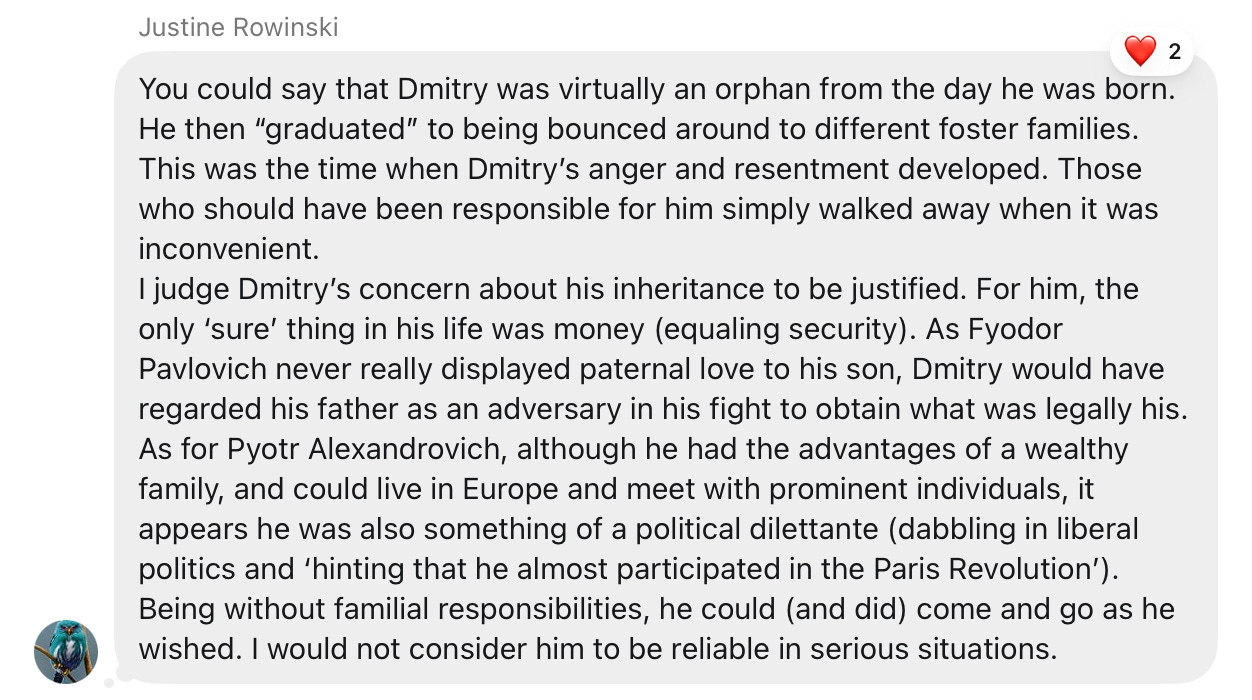
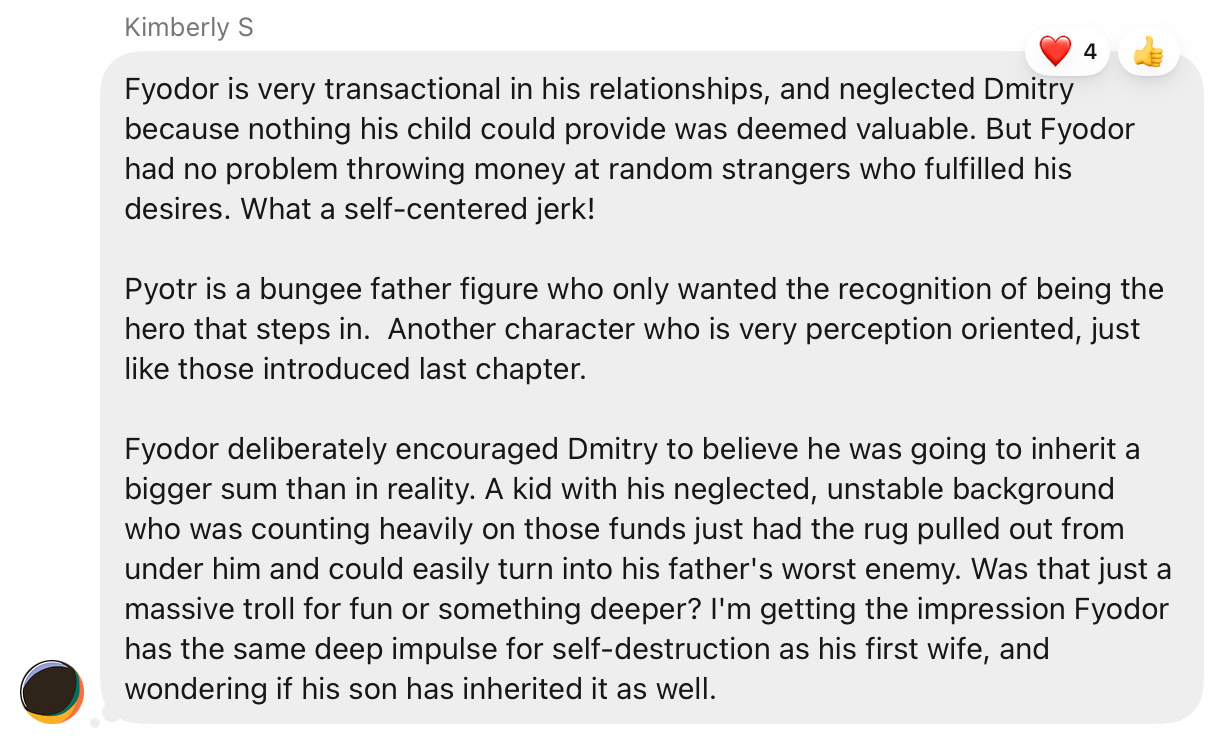
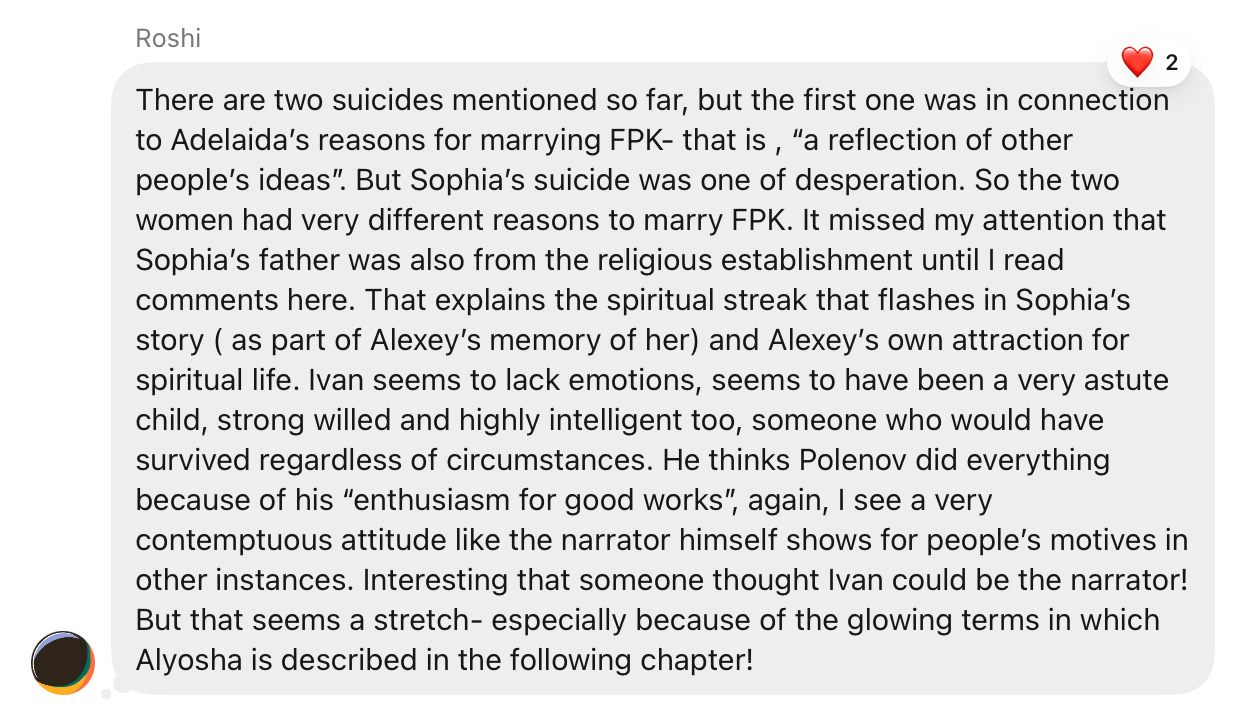


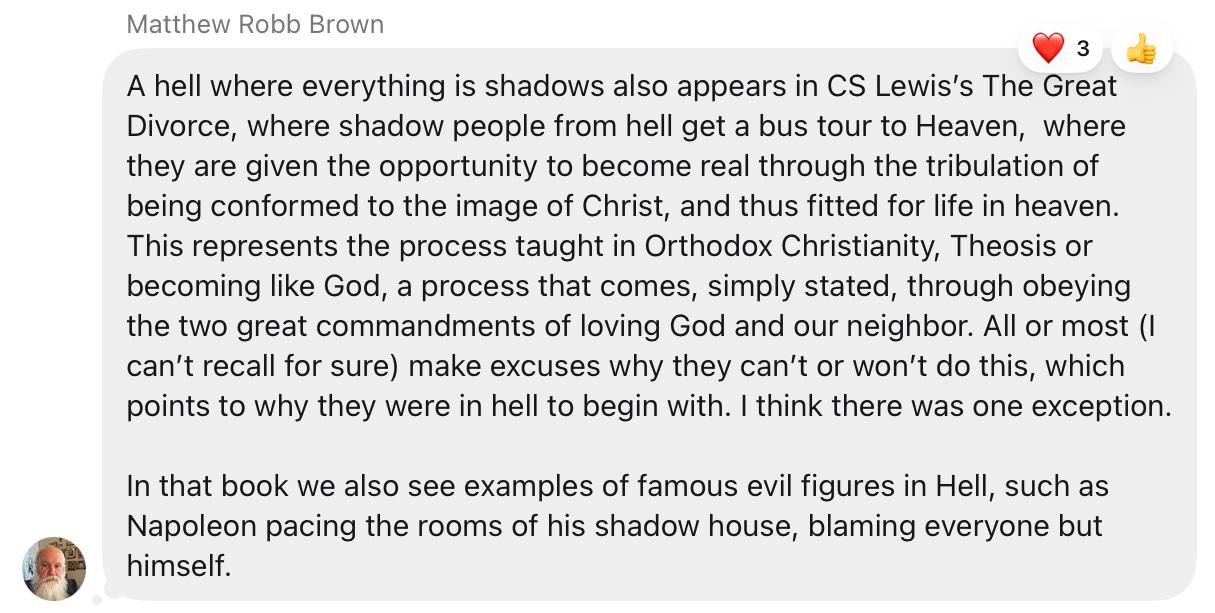
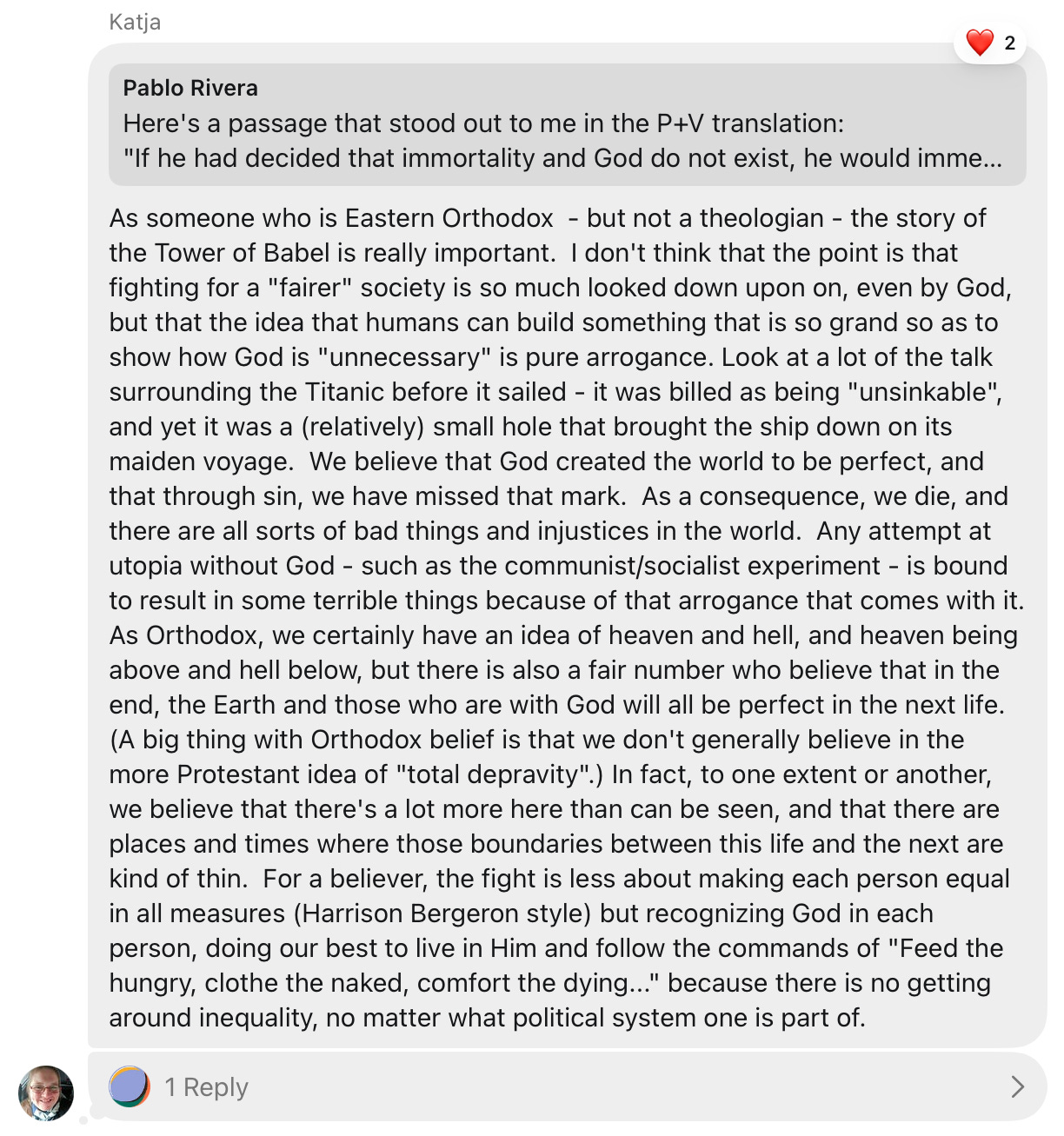

I want to share some background infos on Eastern Orthodoxy which I found helpful for my understanding of the the novel so far (I am not familiar with Eastern Christianity)
The Eastern Orthodox Church has a long tradition of intimate experience and inner stillness, in which contemplative prayer or the immersion in icons silences the mind to progress along the path to God.
In Orthodoxy the Bible and the texts of the Church Fathers play an important role in preaching and catechesis as well as the acceptance of emotion in the life of piety, which is also expressed in a stronger focus on mystical forms of prayer and meditation (prayer of the heart).
For the Orthodox Church, the nature of God is a profound mystery. Words cannot exhaust it, the intellect cannot force it into concepts and categories, logic cannot piece it together for human purposes. The reality of God is in darkness and eludes any rational grasp. It is the reality that Moses already experienced: Closeness and distance, mercy and aloofness, splendour and darkness, grace and mystery, presence and passing by at the same time.
Charismatic authorities such as Hermits and church fathers, who represent the church on a very individual level, are seen as images of divine perfection on which their authority is based. The task of these charismatic teachers is to help students not to think for themselves. That is why the teacher-student relationship is based on unconditional submission and radical obedience.
Literally translated, starez means ‘venerable old man’ and refers to the function of spiritual teacher and spiritual guide for novices and lay people. He has no administrative function within the monastery. He lived in the prayer of God's presence, simplicity of thought, incessant ascetic practice and the resulting mystical experiencen (charismatic approach to God). Under the guidance of a master, he gained experience in spiritual struggle. He practises the unceasing prayer to Jesus, and in the realisation of his heart he leads a life in Christ.
Eastern Orthodoxy consciously rejected enlightenment and intellectual concepts and by doing so rejected Western educational ideals.
Dostoevski, as a young man, was drawn to western ideas and later he embraced orthodox rituals, especially after his two years old son Aljosha died in 1878. He sought support by starez Amvrossij at the cloister Optina Pustyn, who asked Dostoevski if his wife by all means was a believer and when Doestevski affirmed, he blessed her and according to a letter by Anna Dostoevski “he spoke those words, which Starez Zosima addresses in the novel to the grieving mother” (Guski 2018).
German philosopher Jürgen Habermas describes in his book Auch eine Geschichte der Philosophie. Band 1: Die okzidentale Konstellation von Glauben und Wissen; Band 2: Vernünftige Freiheit. Spuren des Diskurses über Glauben und Wissen (Suhrkamp, Berlin 2019) how the expansion of the Roman Empire’s led to the Latinization of the Western hemisphere which laid the ground for societal modernization and reforms from which later social, legal, cultural, philosophical, economic etc. progress and rationalism developed.
In contrast the Greek Empire wasn’t as successful as the Roman Empire in spreading its language as a common denominator (the question of language plays a role in the chiasm between the western and eastern orthodox church). Greek Orthodoxy didn’t embrace reforms and remained much more focused on preserving traditions. This led to some sort of a standstill and persistence, stressing the need for a right lifestyle and embracing mysticism.
Excellent! Thank you!